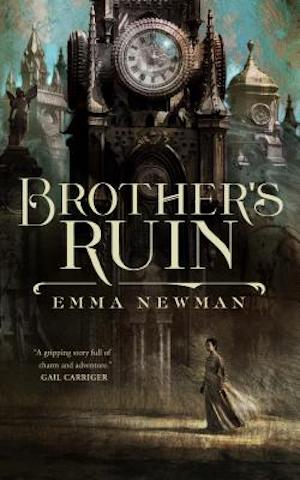Heroism, a keen awareness that with great power comes great responsibility, ambition, visiting wizards in the company of dwarves… all excellent motivations to propel protagonists out of their comfortable living rooms and into adventure! If you really want to push your characters into embracing high-risk ventures, however, you cannot beat the motivational power of crushing debt1.
Appleseed by Masamune Shirow (1985–1989)

AI Prometheus rose in the aftermath of World War Three to restore order to a shattered world. Prometheus’ genetically engineered “bioroids” are conditioned from birth to serve loyally. This leaves the matter of non-bioroid recruits like Briareos Hecatonchires. How best to ensure compliance with Prometheus’ needs?
Crushing debt! Briareos is a cyborg. The machinery that constitutes much of his body is highly advanced, but not so advanced that it repairs itself. Repairs are not free. Prometheus chooses not to foot the repair bills for employees. After all, if cyborgs are desperate to keep their bodies functioning, the less prone they will be to ask awkward questions.
Obviously, Prometheus desires only the greatest good for the greatest number. Nevertheless, it’s useful to keep staff members too distracted to protest actions like confiscating prosthetic limbs in war zones or to ask questions like “If Prometheus is so awesome, why is the bioroid suicide rate so high?”
The Ghost Bride by Yangsze Choo (2013)

Colonial Malaysia’s wealthy Lim family has a small problem. Lim Tian Ching needs a wife. While Tian Ching’s personality isn’t all a bride could hope for, the advantages of marrying into the Lim family would normally be sufficient distraction from Tian Ching’s less charming qualities. However, Tian Ching is dead. Few women will marry a corpse, even one with a ghost as active as Tian Ching’s.
Li Lan might be the exception. Her widower father, consumed by grief and opium, has massive debts. Once, Li Lan was engaged to Tian Ching’s cousin Tian Bai. Tian Ching’s death elevated Tian Bai to family heir, too high status for a woman like Li Lan. She seems an ideal candidate on whom to foist Tian Ching. If she objects? The Lim family owns her father’s crushing debts.
If you’re thinking that the plot sounds a bit different from the 2020 television adaptation of The Ghost Bride, that’s because some liberties were taken while adapting the novel. As they usually are.
Brother’s Ruin by Emma Newman (2017)

Great Britain’s Society for Esoteric Arts sweetens impressment with bribery. Candidates have no choice about joining if “invited,” but the Society does monetarily compensate candidates’ families in proportion to the draftee’s abilities.
The Gunns could be rescued from debt-ridden precarity by the Society, if only young Benjamin Gunn were the mage that his sister Charlotte is, or if Charlotte wanted to be press-ganged by the Society. Since she does not, Charlotte must somehow create the appearance that Benjamin is her equal… while simultaneously fending off the predatory loan sharks to whom the Gunns owe their crushing debts.
Readers might wonder how prudent it is for criminals to target and blackmail families with at least two mage-candidates. The criminals have also pondered this question, which is why they count among their numbers moonlighting mages more experienced than either Gunn sibling.
Black Water Sister by Zen Cho (2021)

US medical debt collection is relentless but not global. Accordingly, when faced with crushing debt in the form of impossible-to-pay medical bills, Jessamyn Teoh and her parents return to Penang. Fleeing the US means leaving Jessamyn’s girlfriend Sharanya behind. How fortunate, then, that Jessamyn’s dead grandmother’s shade serves as a relentless distraction to the relocated protagonist.
Death does not prevent Ah Ma from pursuing vendettas, particularly against billionaire Dato’ Ng Chee Hin. Dato’ Ng Chee Hin’s development plans are an affront to Ah Ma, and more importantly to the god—Black Water Sister—that Ah Ma served in life. Now Jessamyn must decide who she will anger: a well-connected oligarch or an angry god. Or both.
I had assumed that American debt collectors had planetary reach, if not interplanetary. Apparently not. Interesting to know. Also irrelevant to single-payer health care Canadians2, unless by some chance Canadians were to spend decades electing to office politicians either uninterested in maintaining the system or actively hostile to it… What are the odds of that?
The Princess of Thornwood Drive by Khalia Moreau (2023)

An automobile accident killed Laine’s parents and left Laine’s sister Alyssa in a vegetative state, lost in an inner fantasy world. In the wake of the tragedy (for which Laine blames herself), Laine discovered that her father had left massive debts. Holding down a job while caring for Alyssa and fending off debt collectors seems a nearly impossible challenge.
Enter Lake Forest Adult Day Center, whose offer of affordable daytime care is the lifebuoy Laine desperately needs. Lake Forest can provide Laine with the free daytime hours she needs for work. There’s also the prospect of a relationship with Lake Forest’s charming Doctor Robert Remson. If only Lake Forest didn’t offer something even worse than economic precarity.
I expected the issue driving the plot to be medical debt, but while that is a factor, it’s the father’s crushing non-medical debts that dominate. Also, Laine has a shortage of something more precious: hours in the day. Of course, that’s a problem money can solve, so ultimately all of Laine’s problems come down to a need for more money.
Debt is, of course, a wildly popular motivator in fiction and in real life3. There are many speculative fiction books that either feature debt or were motivated by it. Perhaps your favorite examples were not mentioned above. If so, please mention them in comments.
- Marc Miller, designer of the classic table top RPG Traveller, made debt a primary plot driver. Player characters needed to scramble to pay eye-watering bills each month. The only reason Richard S. McEnroe’s extremely Traveller-esque The Shattered Stars isn’t getting a mention here is because I cited it in a 2023 essay on this site. ↩︎
- Foresighted Canadians remember to sign up for valid insurance while visiting the US. ↩︎
- Although I suspect “five books written purely for the money” would not go over well as a review topic. Or would it? ↩︎










